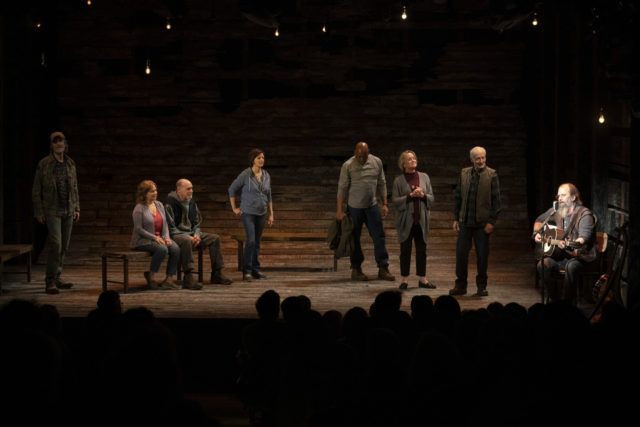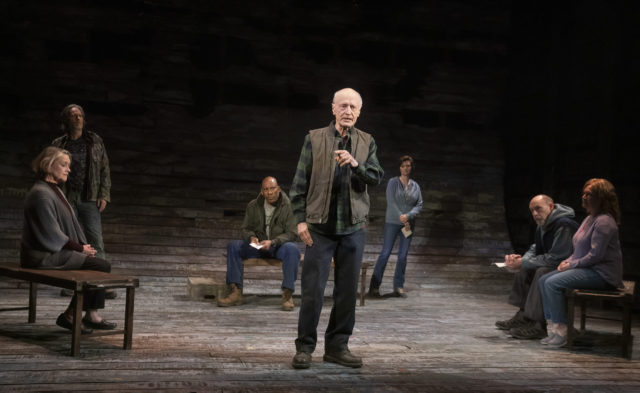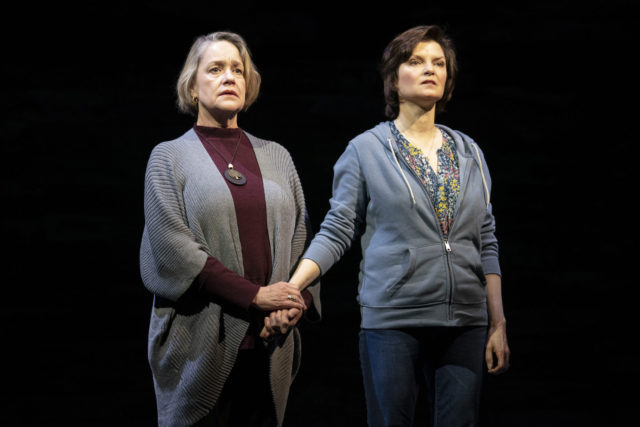
The characters of Coal Country listen to Steve Earle sing about a horrific mining disaster (photo by Joan Marcus)
COAL COUNTRY
Cherry Lane Mainstage Theatre
38 Commerce St.
Tuesday – Sunday through April 17, $39-$77
212-989-2020
www.cherrylanetheatre.org
coalcountrymusical.com
Coal Country is a damning portrait of much that’s wrong in America today, a tale of corporate greed, corruption, union busting, an unequal justice system, and a lack of compassion for one’s fellow human beings. And it’s all true.
On April 5, 2010, more than two dozen men died in the Upper Big Branch Mine disaster in Raleigh County, West Virginia. Jessica Blank and Erik Jensen’s documentary play is set at the end of the trial of Massey Energy CEO Don Blankenship, who ran the mine. The action begins as Judge Berger (Kym Gomes) has opened the floor for relatives and colleagues to share their stories of what happened before, during, and after the horrific event, the worst mining disaster in the United States in forty years. The audience serves as a kind of jury as the characters speak verbatim dialogue, word for word what the real men and women of Raleigh County said.
Patti Stover (Mary Bacon) talks about her chance at second love with Gregory Steven Brock, who went to the mine that day even though he wasn’t feeling well because he couldn’t afford to take time off. Tommy Davis (Michael Laurence) worked in the mines with his brother Timmy and nephews Cory and Josh; like many people who lived in the company town, mining went back generations.
Roosevelt Lynch Jr. (Ezra Knight) would pass by his father every morning, one having just finished a shift, the other about to start one. Dr. Judy Petersen’s (Deirdre Madigan) brother Dean did everything with his twin brother, Gene, but shortly after they both began in the mine, Gene quit while Dean stayed on.

Gary Quarles (Thomas Kopache) shares the story of his son in Coal Country (photo by Joan Marcus)
Gary Quarles’s (Thomas Kopache) son was tired of working off the dangerous longwall. “I’d say Massey ran outlaw from the day Blankenship brought ’em in,” Gary says about the hiring of nonunion employees. “We always said that Massey Energy was his third world country, and Don was the dictator.”
The de-facto leader of the group is Stanley Stewart, known as Goose (Carl Palmer), a third-generation miner whose grandfather was killed on the job. Goose told his wife, Mindi (Amelia Campbell), about how he could see trouble was brewing because of how the new ownership was dealing with basic health and safety issues. “My first twenty years was union. This was the strongest union place in the world before Massey came in,” Goose says. Gary adds, “And I’ll tell you what, you didn’t worry ’bout gettin’ fired by speakin’ up.”
Throughout the play, Grammy-winning folk-country-rock troubadour and activist Steve Earle plays related songs from his chair in the front right corner of the stage, switching between acoustic guitar and banjo. He sometimes gets up and joins the cast, who occasionally sing lines and choruses with him. Earle’s score ranges from the traditional folk song “John Henry,” about an African American “steel drivin’ man” battling a steam drill in the Big Bend Tunnel in West Virginia in the nineteenth century, to “Heaven Ain’t Goin Nowhere,” “The Devil Put the Coal in the Ground,” and “It’s About Blood.”
In “Union, God, and Country,” Earle asks the audience to sing along to these key lines: “Union, god, and country / West Virginia gold and blue / Union, god, and country / was all we ever knew.” Earle also performs his 2013 bluegrass song “The Mountain,” in which he explains, “I was born on this mountain / This mountain’s my home / And she holds me and keeps me from worry and woe / Well, they took everything that she gave / Now they’re gone / But I’ll die on this mountain / This mountain’s my home.” I’ve seen Earle numerous times over the years, from the Ritz and the Bottom Line to the Blue Note, the Lone Star Roadhouse, and Judson Church, and he is an inspired choice for Coal Country; he also served as composer and onstage narrator in Richard Maxwell’s existential Western Samara for Soho Rep. in 2017. On April 5, 2020, Earle played the songs of Coal Country in a free Facebook Live concert and has recorded them for the album Ghosts of West Virginia. (Wednesday night shows will be followed by a discussion with Earle on March 16 and 30 and Blank and members of the cast on March 23 and April 6.)

Dr. Judy Petersen (Deirdre Madigan) and Mindi Stewart (Amelia Campbell) wait for word of their relatives in Coal Country (photo by Joan Marcus)
An Audible production that had to cut short its premiere run at the Public in March 2020 because of the pandemic lockdown, the ninety-minute Coal Country has made a successful transition to the Cherry Lane. Richard Hoover’s wood-based set at times places the audience inside the mine, with David Lander’s lighting signaling trouble behind the slats of broken wood in the back. Movement director Adesola Osakalumi guides the actors on- and offstage as they rearrange various benches, providing much-needed breaks between emotional moments.
Married partners Blank and Jensen previously collaborated on such projects as The Exonerated, in which an ensemble reads the words of innocent men and women on death row, and The Line, a virtual Public Theater presentation from July 2020 in which an all-star cast told the verbatim stories of health-care workers and first responders in the early days of the Covid-19 crisis.
In Coal Country, Blank and Jensen do a magnificent job of integrating the individual stories, weaving them together to form a compelling narrative that will have you at the edge of your seat, even if you know exactly what happened. The scenes in which the characters are waiting on news of the fate of their loved ones are unforgettable, especially seen now, after two years of a global health crisis that has killed nearly a million Americans, many of whom died alone, their relatives forbidden to be with them. It’s a uniquely American tale, one that comes amid extreme partisanship, polarization, and divisiveness, but it doesn’t matter where you fall on the political spectrum to be deeply moved and infuriated by its overarching message.
As Earle sings, “It’s about fathers / It’s about sons / It’s about lovers / Wakin’ up in the middle of the night alone / It’s about muscle / It’s about bone / It’s about a river running thicker than water ’cause / It’s about blood.”